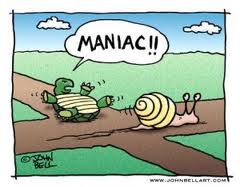This is not a new term, but the concept is new to me this year. In a nutshell, it means writing as much as possible in a concentrated burst, like a sprinter in the 100-yard dash. You can cover a lot of ground this way really fast. It’s a lot like the November NaNo challenge, only even more intense.
It’s extremely productive, so why don’t I do it all the time? Two reasons:
First, it requires setting aside a block of time in which to burst-write. This is challenging in our hectic lives and limited vacation time.
Second, we need to be prepared. You can’t sit down at your computer at the beginning of a burst sprint and ask yourself, “Now what should I write about?” It would be like trying to sprint through a bamboo forest. You won’t get very far.
A successful burst sprint is the culmination of a great deal of prep work. Just like an Olympic sprint, which may only take a few seconds, can only be successful after months of preparation by the sprinters.
I have historically written more like a long-distance runner: slow and steady. Depending on my work schedule, I might get to write once a week for a couple of hours, or not at all. I’ve pushed myself to write daily, and for a few months this year I managed to do it.
I tried burst-writing this year for the first time. I set aside a week in March and physically removed myself from all of the normal day-to-day distractions and just write. For the first time, I’d developed a detailed outline of the story I wanted to write. I had already written the first few chapters, soI felt like I had the character voices down pretty well, and I had a plan in place.
In one week, I wrote 52,000 words. See my full blog post about the event here
Major success. I completed about half of my novel. I am currently working on the second draft of that same novel. The burst was the culmination of several months of worldbuilding, brainstorming, planning, and outlining.
Lessons learned from the writing burst:
- Plan well. I did have a pretty good outline, but I hadn’t addressed a few key concepts in the book, and I’ve had to go back in the second draft and revise.
- Don’t need an entire week. Out of that week, I was most productive over a four-day period, averaging over 10,000 words per day. It was hard to set aside an entire week, but it would be a lot easier to take a weekend and hide away somewhere for two or three days. I could reasonably expect to complete at least 25,000 words in that timeframe. That’s pretty good. Outside of a burst-sprint, it can take weeks or even months to write that much, depending on my schedule.
- Don’t edit while writing. To crank out that many words, you have to trust the plan and let your fingers fly. Just write and keep pushing through the story. This is where a weak outline will kill you because if you hit a snag or don’t know what happens next, you’ll totally lose your momentum.
One of the greatest benefits of burst-writing is seeing solid progress in a short period of time. It’s exciting. Sometimes the slow, plodding pace I’m forced into can be a little discouraging. I start wondering if I’m ever going to finish. Burst sprints help re-vitalize my enthusiasm and keeps me focused on the project.
I am gearing up for another burst-writing session, probably 3 or 4 days in length. I was hoping to do it in November as part of the NaNo challenge, but the timing didn’t work out. I’m still editing this story, and my outline of the next novel is only about 70% complete. I’m hoping for a small burst sprint in December, with a longer one in January.
Until then, I look for one day a week where I can mini-burst: at least 3 hours of dedicated, focused time. Sometimes all I get is an hour, but longer periods are so much more productive because I can get in “the zone’ and stay there, cranking out the words.
For me, a two-hour minimum block of time is most productive. What have other people found works best for them? Have you tried burst-writing? Has it worked for you?


Pingback: Burst Writing « Blog « TheStoryLives – by Frank Morin
I totally relate to this. After several months of solid prep work, I feel on the cusp of a pretty great burst any minute now. It’s so very satisfying to write large quantities at one time.
I have not specifically tied this, but I am going to. I need to. My NaNo has turned into an epic failure because I hit a snag and had no idea where my story was going. I’m normally a plotter and tried pantsing this one. That’s not working. Now I need to outline and plan it, so I can continue. Thanks for the tips on how to try this and do it successfully.
I’ve heard that this is how Michael Moorcock wrote a lot of his books. Some of his Hawkmoon books, for instance, were written in three days apiece. Granted, a lot of his books are tiny, but it’s still an impressive feat.